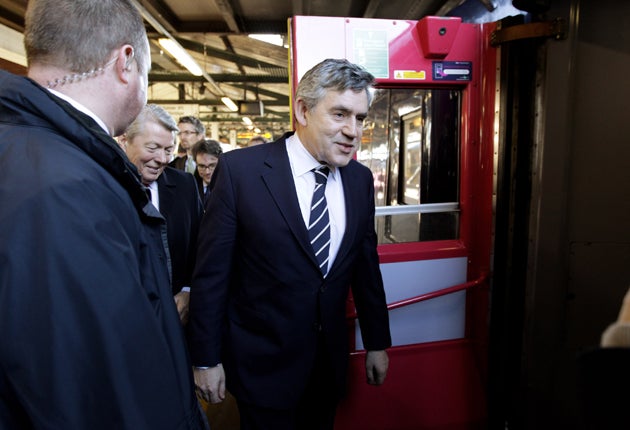Hung parliament looms as Tory poll lead cut to 5 points
Projected result would still leave Conservatives trailing Labour by 17 seats

Your support helps us to tell the story
From reproductive rights to climate change to Big Tech, The Independent is on the ground when the story is developing. Whether it's investigating the financials of Elon Musk's pro-Trump PAC or producing our latest documentary, 'The A Word', which shines a light on the American women fighting for reproductive rights, we know how important it is to parse out the facts from the messaging.
At such a critical moment in US history, we need reporters on the ground. Your donation allows us to keep sending journalists to speak to both sides of the story.
The Independent is trusted by Americans across the entire political spectrum. And unlike many other quality news outlets, we choose not to lock Americans out of our reporting and analysis with paywalls. We believe quality journalism should be available to everyone, paid for by those who can afford it.
Your support makes all the difference.David Cameron suffered a new setback as the Conservative Party's lead over Labour dropped to just five points in the latest ComRes poll for The Independent. It suggests that Labour would have 17 more seats than the Tories in a hung parliament.
The survey puts the Tories on 37 per cent (down one point since last month), Labour on 32 per cent (up one point), the Liberal Democrats on 19 per cent (unchanged) and other parties on 12 per cent (unchanged). It is the Tories' smallest lead in our monthly poll since December 2008.
If repeated at a general election, the latest figures would leave Gordon Brown 32 seats short of an overall majority in a hung parliament. According to John Curtice, professor of politics at Strathclyde University, Labour would have 294 seats, the Tories 277, the Liberal Democrats 46 and others 33.
Such a result could pave the way for a deal between Labour and the Liberal Democrats that would keep Labour in power, with Nick Clegg's party supporting a Brown government in key votes. But it could provoke a major constitutional row, since the Tories would have won the battle for the popular vote but lost the election due to the first-past-the-vote system, which helps Labour.
The poll will add to the jitters in the Tory camp and on the financial markets, where the pound dropped yesterday amid fears that a hung parliament would make decisive action to cut the public deficit less likely. At one point, sterling fell to a nine-month low of 1.478 against the dollar.
Nick Beecroft, senior foreign exchange consultant at Saxo Bank, said: "So long as the markets could harbour some hope that the next government, in only three months' time, would be a fiscally prudent, business-friendly Conservative one that would act swiftly to reduce the UK deficit and borrowing mountains, the pound was able to hold its own against the euro but today the dam burst and it could not even do that."
ComRes also tested voters' perceptions of Mr Brown and Mr Cameron. It found they were neck and neck on the economy, with 43 per cent of people believing Mr Cameron had the right skills to lead Britain back to economic health and 42 per cent saying the same of Mr Brown.
Some 45 per cent believed the Tory leader would reduce Britain's debt if he wins the election, while fewer people (37 per cent) thought Mr Brown would. Mr Cameron (48 per cent) was seen as a strong leader by more voters than Mr Brown (43 per cent).
Allegations of bullying at Downing Street did not appear to have damaged the Prime Minister. One in five (20 per cent) of people believed he was "an unpleasant bully" but 69 per cent did not, while 12 per cent thought Mr Cameron was (and 78 per cent did not).
ComRes found that the Tories were ahead in the South-east and the Midlands but trailed Labour in the North of England, where they need to win seats to gain an overall majority. More Labour voters appeared to be returning to the fold: the proportion of people who supported the party in 2005 and said they would vote for it this year has risen from 56 to 62 per cent since last month. Support for Mr Brown was strongest among the C2 skilled workers and bottom DE social group, confirming that Labour has won back some disenchanted core voters.
Mr Cameron's personal appeal was strongest in the South-east. Younger people were the least likely to vote Conservative but were the most likely to regard him as a strong leader. Older voters, who were more likely to vote, were less convinced. Thirty-five per cent of Labour supporters believed Mr Cameron was a strong leader, while 28 per cent of Tory supporters said the same of Mr Brown.
Privately, both Labour and Tory strategists believe the Tory lead nationally is about five or six points, even though a YouGov survey at the weekend put it at just two points. A separate YouGov poll for The Sun today, taken after Mr Cameron's speech to his party's spring conference in Brighton, shows the Tories on 39 per cent, Labour on 32 per cent and the Liberal Democrats on 12 per cent.
*ComRes telephoned 1,005 GB adults between 26 and 28 February 2010. Data was weighted by past vote recall. ComRes is a member of the British Polling Council and abides by its rules. Full tables at www.comres.co.uk
Join our commenting forum
Join thought-provoking conversations, follow other Independent readers and see their replies
Comments